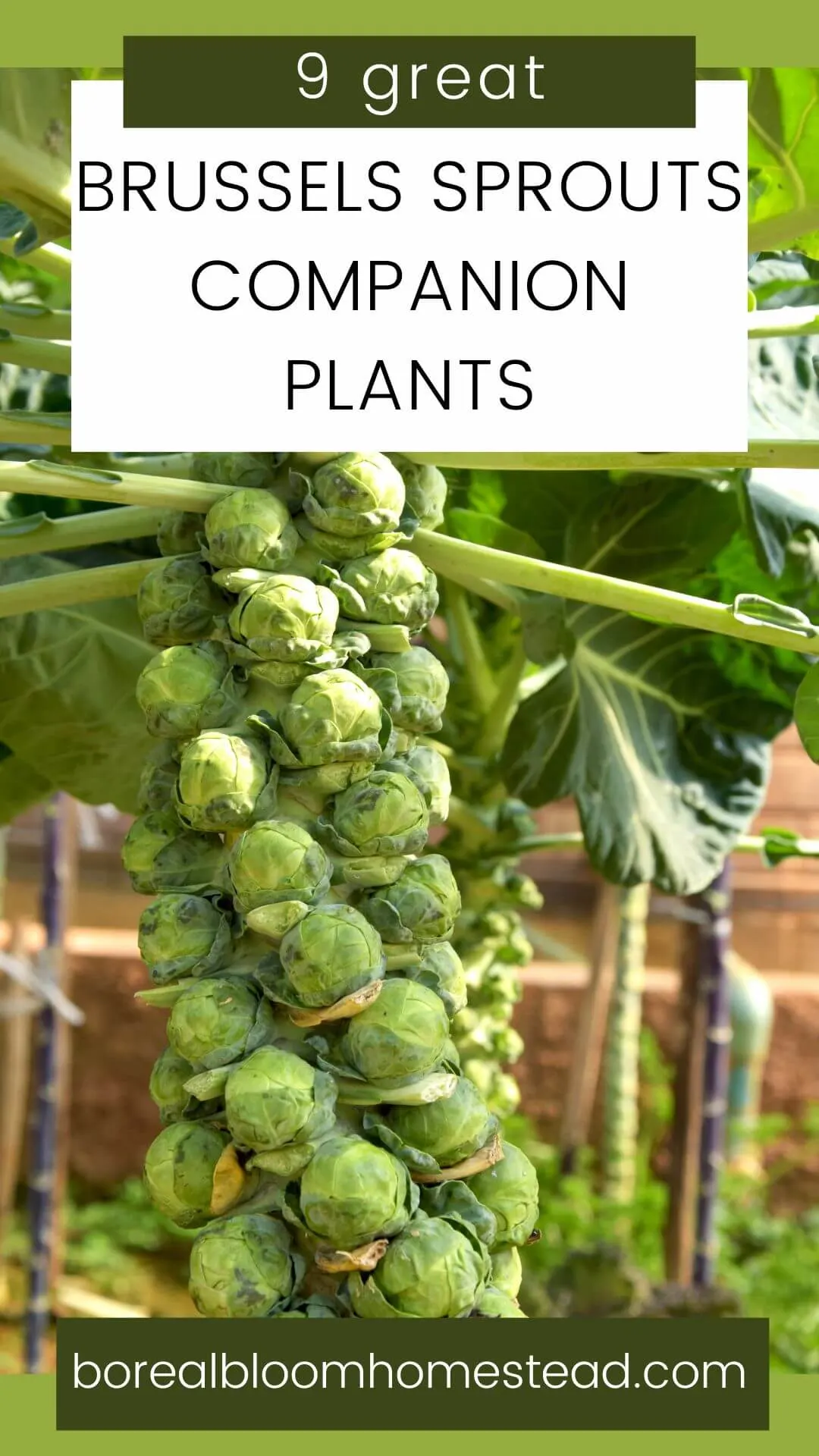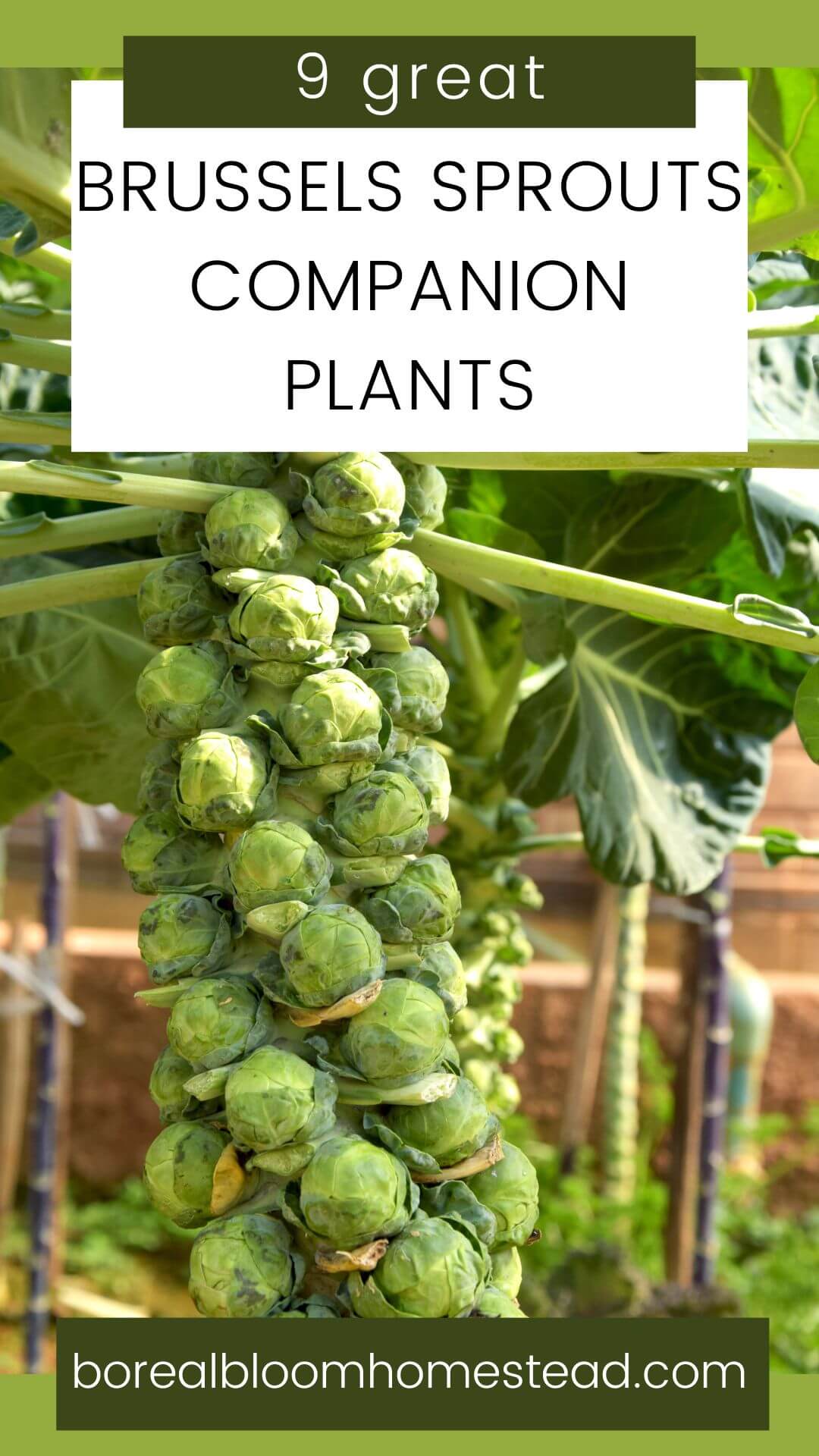The Ultimate Guide To Companion Planting With Brussels Sprouts
The Ultimate Guide to Companion Planting with Brussels Sprouts
Brussels sprouts are a delicious and nutritious winter vegetable that can be grown in most gardens. However, they can be susceptible to pests and diseases, so it's important to plant them with companion plants that can help to deter these problems.
In this guide, we will discuss the benefits of companion planting with Brussels sprouts, and we will recommend some of the best companion plants for this vegetable. We will also provide some tips on how to plant and care for Brussels sprouts in your garden.
Benefits of Companion Planting with Brussels Sprouts
There are many benefits to companion planting with Brussels sprouts. Some of the most important benefits include:
- Disease and pest control: Companion plants can help to deter pests and diseases that can affect Brussels sprouts. For example, marigolds are known to repel aphids, and nasturtiums can attract beneficial insects that prey on pests.
- Improved soil quality: Some companion plants can help to improve the soil quality around Brussels sprouts, making it more nutrient-rich and draining well. For example, legumes such as peas and beans can fix nitrogen in the soil, which is essential for Brussels sprouts' growth.
- Attract pollinators: Some companion plants can attract pollinators such as bees and butterflies. These pollinators are important for the pollination of Brussels sprouts, which helps to ensure a good crop.
- Increased yields: Companion planting can help to increase the yields of Brussels sprouts. This is because companion plants can help to improve the overall health and well-being of the plants, making them more resistant to pests and diseases and more productive.
Best Companion Plants for Brussels Sprouts
There are many different companion plants that can be grown with Brussels sprouts. Some of the best companion plants include:
- Alliums: Alliums such as onions, garlic, and chives are known to repel pests such as aphids, cabbage worms, and flea beetles. They also help to improve the flavor of Brussels sprouts.
- Carrots: Carrots help to improve the flavor of Brussels sprouts and can also help to deter pests such as carrot rust flies.
- Chamomile: Chamomile is a flowering plant that helps to attract beneficial insects such as ladybugs and lacewings. These insects prey on pests that can damage Brussels sprouts.
- Cucumbers: Cucumbers help to suppress weeds and can also help to attract pollinators.
- Lettuce: Lettuce helps to suppress weeds and can also help to improve the flavor of Brussels sprouts.
- Marigolds: Marigolds are known to repel a variety of pests, including aphids, whiteflies, and nematodes. They also help to improve the soil quality around Brussels sprouts.
- Nasturtiums: Nasturtiums are known to attract beneficial insects such as ladybugs and lacewings. These insects prey on pests that can damage Brussels sprouts. They also help to improve the soil quality around Brussels sprouts.
- Peas: Peas help to fix nitrogen in the soil, which is essential for Brussels sprouts' growth. They also help to suppress weeds.
- Spinach: Spinach helps to suppress weeds and can also help to improve the flavor of Brussels sprouts.
How to Plant and Care for Brussels Sprouts
Brussels sprouts can be grown from seed or from transplants. If you are planting from seed, sow the seeds 1/2 inch deep and 2 inches apart. If you are planting transplants, space them 2-3 feet apart.
Brussels sprouts prefer full sun and well-drained soil. They should be watered regularly, especially during dry weather. Fertilize Brussels sprouts every few weeks with a balanced fertilizer.
Brussels sprouts are ready to harvest when the sprouts are about 1-2 inches in diameter. Harvest the sprouts by cutting them off the main stem with a sharp knife.
Conclusion
Companion planting is a great way to improve the health and productivity of your Brussels sprouts plants. By planting Brussels sprouts with the right companion plants, you can help to deter pests and diseases, improve the soil quality, and attract pollinators. This will lead to healthier plants and a better harvest.
Brussels sprouts are a delicious and nutritious vegetable that can be grown in many different climates. But did you know that companion planting can help to improve their growth and flavor?
Companion planting is the practice of planting different types of plants together in order to create beneficial relationships between them. For example, some plants can help to repel pests, while others can improve the soil quality.
When it comes to Brussels sprouts, there are a number of companion plants that can be beneficial. Some of the best include:
- Carrots: Carrots help to improve the flavor of Brussels sprouts.
- Chamomile: Chamomile helps to repel cabbage moths.
- Dill: Dill attracts pollinators, which can help to improve the pollination of Brussels sprouts.
- Garlic: Garlic helps to repel aphids and other pests.
- Marigolds: Marigolds help to repel nematodes and other soil-borne pests.
- Peas: Peas help to fix nitrogen in the soil, which can benefit Brussels sprouts.
- Potatoes: Potatoes help to deter root-knot nematodes.
- Spinach: Spinach helps to suppress weeds.
If you're interested in learning more about companion planting with Brussels sprouts, I recommend visiting Garden Wiki. This website provides a comprehensive guide to companion planting, with information on a variety of different vegetables.
FAQ of companion planting with brussel sprouts
What are some good companion plants for Brussels sprouts?
Some good companion plants for Brussels sprouts include:
- Beets: Beets help to improve the soil quality and add magnesium, which is beneficial to Brussels sprouts. They also help to deter pests.
- Carrots: Carrots help to improve the flavor of Brussels sprouts. They also help to loosen the soil, which can help Brussels sprouts to grow better.
- Herbs: Aromatic herbs, such as mint, basil, rosemary, and garlic, can help to deter pests from Brussels sprouts.
- Lettuce: Lettuce helps to suppress weeds and shade the soil, which can help to keep it cool and moist.
- Marigolds: Marigolds are a good trap crop for pests that can attack Brussels sprouts.
What plants should not be planted near Brussels sprouts?
Some plants that should not be planted near Brussels sprouts include:
- Other cabbage family members: This includes broccoli, cauliflower, kale, and collard greens. These plants are susceptible to the same pests and diseases, so planting them together can increase the risk of infection.
- Peas: Peas can compete with Brussels sprouts for nutrients and water.
- Potatoes: Potatoes can harbor the potato beetle, which can also attack Brussels sprouts.
- Spinach: Spinach can attract the same pests as Brussels sprouts, such as aphids and cabbage loopers.
- Tomatoes: Tomatoes can attract the tomato hornworm, which can also attack Brussels sprouts.
What are the benefits of companion planting with Brussels sprouts?
There are many benefits to companion planting with Brussels sprouts. Some of the benefits include:
- Improved crop yield: Companion planting can help to improve the yield of Brussels sprouts. For example, beets can help to improve the soil quality, which can lead to larger and healthier Brussels sprouts.
- Disease and pest control: Companion planting can help to deter pests and diseases from Brussels sprouts. For example, marigolds are a good trap crop for pests that can attack Brussels sprouts.
- Attracting beneficial insects: Companion planting can attract beneficial insects, such as ladybugs and lacewings, which can help to control pests.
- Improved soil quality: Companion planting can help to improve the soil quality, which can benefit all of the plants in your garden.
- Reduced workload: Companion planting can help to reduce the workload in your garden. For example, herbs that repel pests can help to reduce the need for pesticides.
When should I plant Brussels sprouts with companion plants?
You can plant Brussels sprouts with companion plants at the same time. However, it is important to plant the companion plants that have different growth habits in different parts of your garden. For example, tall companion plants, such as sunflowers, should be planted in the back of your garden, while short companion plants, such as carrots, should be planted in the front.
Image of companion planting with brussel sprouts
Beet and Brussels Sprouts
 Beet plants are said to be great companion plants for brussels sprouts because they add magnesium back to the soil to help support your growing sprouts.
Beet plants are said to be great companion plants for brussels sprouts because they add magnesium back to the soil to help support your growing sprouts.Herbs and Brussels Sprouts
 Aromatic herbs make some of the best companion plants. They can help to deter pests and attract beneficial insects. Some good herbs to plant with brussels sprouts include basil, chives, dill, mint, and rosemary.
Aromatic herbs make some of the best companion plants. They can help to deter pests and attract beneficial insects. Some good herbs to plant with brussels sprouts include basil, chives, dill, mint, and rosemary.Marigolds and Brussels Sprouts
 Marigolds are another great companion plant for brussels sprouts. They help to repel pests, such as cabbageworms and aphids.
Marigolds are another great companion plant for brussels sprouts. They help to repel pests, such as cabbageworms and aphids.Nasturtiums and Brussels Sprouts
 Nasturtiums are another flowering plant that can be planted with brussels sprouts. They help to attract beneficial insects, such as ladybugs and lacewings, which can help to control pests.
Nasturtiums are another flowering plant that can be planted with brussels sprouts. They help to attract beneficial insects, such as ladybugs and lacewings, which can help to control pests.Tomatoes and Brussels Sprouts
 Tomatoes and brussels sprouts can be planted together because they have similar growing requirements. They both need full sun and well-drained soil.
Tomatoes and brussels sprouts can be planted together because they have similar growing requirements. They both need full sun and well-drained soil.
Post a Comment for "The Ultimate Guide To Companion Planting With Brussels Sprouts"